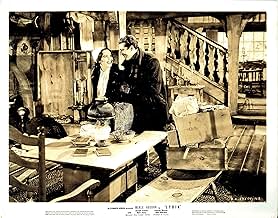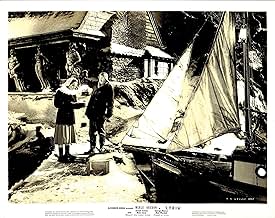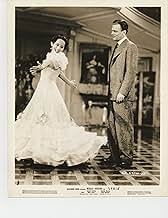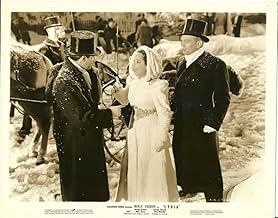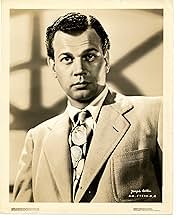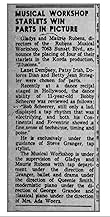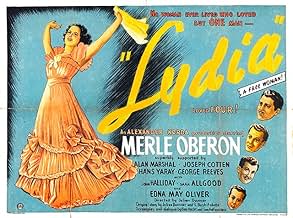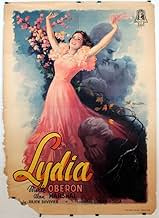Aggiungi una trama nella tua linguaFour friends reminisce in old age. Each of the men had been in love with the main character, Lydia. The interweaving stories reveal the reason why she never married any of them and, indeed, ... Leggi tuttoFour friends reminisce in old age. Each of the men had been in love with the main character, Lydia. The interweaving stories reveal the reason why she never married any of them and, indeed, never married at all.Four friends reminisce in old age. Each of the men had been in love with the main character, Lydia. The interweaving stories reveal the reason why she never married any of them and, indeed, never married at all.
- Regia
- Sceneggiatura
- Star
- Candidato a 1 Oscar
- 5 vittorie e 1 candidatura in totale
Hans Jaray
- Frank
- (as Hans Yaray)
Evelyn Beresford
- Sarah's Guest
- (non citato nei titoli originali)
Tyler Brooke
- Vaudeville Singer
- (non citato nei titoli originali)
Frank Conlan
- Old Ned
- (non citato nei titoli originali)
Harry Cording
- Hotel House Detective
- (non citato nei titoli originali)
Hal K. Dawson
- Hotel Desk Clerk
- (non citato nei titoli originali)
Jack Deery
- Ball Guest
- (non citato nei titoli originali)
Paul Everton
- Sarah's Guest
- (non citato nei titoli originali)
Jesse Graves
- Michael's Servant
- (non citato nei titoli originali)
Bobbie Hale
- Bar Patron
- (non citato nei titoli originali)
Gertrude Hoffman
- Mrs. Fairfield
- (non citato nei titoli originali)
Recensioni in evidenza
When the film was finally released in Duvivier's native France ,it did not meet critical favor.I personally find little fault with the opinions expressed."Lydia" is a confused cold work.Duvivier's great American movies are not "Great Waltz" or "Lydia" .They were yet to come:"tales of Manhattan" and "Flesh and fantasy" are immensely superior to the aforementioned efforts.
"Lydia" is supposed to be a remake of "Un Carnet de Bal ",Duvivier's indisputable masterpiece.But the two works are worlds apart.I would go as far as to write "Lydia" is to "Carnet de Bal" what "The long night" is to "Le jour se lève" .But Carné's chef d'oeuvre was remade by Anatole Litvak whereas Duvivier redid himself.
Actually "Lydia" reminds me of Duvivier failed film "Untel Père Et Fils " ;it's a hodgepodge : a grumpy granny with a golden heart, a sailor ,the Civil War(?) , a blind pianist ,the sad fate of blind children during the nineteenth century, the good lady whose life is not empty cause she creates a house for these unfortunate kids (a permanent feature of the French cinema of the era : see also "Le Voile Bleu"-remade as "the blue veil" - and "Péchés de Jeunesse").
Nothing is left from the original work,the Madeleine of Proust of the French cinema: and showing Merle Oberon with her three beaus (and the fourth is not far away)does not make up for Marie Bell's spleen,solitude and nostalgia on the banks of the lake.One should also add that the male characters are not really interesting.
Orson Welles was a great Duvivier fan and it's probably the reason why Joseph Cotten is part of the cast.Later,Welles would borrow the female star of "Au Royaume des Cieux" (Suzanne Cloutier) from Duvivier for his "Othello".
The best of this movie is its pictures:the ball is nicely filmed ,although a bit kitsch;the snowy landscapes are enhanced by a refined cinematography.
The sound of my copy is rather lousy. The music ,which is intrusive,often drowns out the actors' voices.
"Lydia" is supposed to be a remake of "Un Carnet de Bal ",Duvivier's indisputable masterpiece.But the two works are worlds apart.I would go as far as to write "Lydia" is to "Carnet de Bal" what "The long night" is to "Le jour se lève" .But Carné's chef d'oeuvre was remade by Anatole Litvak whereas Duvivier redid himself.
Actually "Lydia" reminds me of Duvivier failed film "Untel Père Et Fils " ;it's a hodgepodge : a grumpy granny with a golden heart, a sailor ,the Civil War(?) , a blind pianist ,the sad fate of blind children during the nineteenth century, the good lady whose life is not empty cause she creates a house for these unfortunate kids (a permanent feature of the French cinema of the era : see also "Le Voile Bleu"-remade as "the blue veil" - and "Péchés de Jeunesse").
Nothing is left from the original work,the Madeleine of Proust of the French cinema: and showing Merle Oberon with her three beaus (and the fourth is not far away)does not make up for Marie Bell's spleen,solitude and nostalgia on the banks of the lake.One should also add that the male characters are not really interesting.
Orson Welles was a great Duvivier fan and it's probably the reason why Joseph Cotten is part of the cast.Later,Welles would borrow the female star of "Au Royaume des Cieux" (Suzanne Cloutier) from Duvivier for his "Othello".
The best of this movie is its pictures:the ball is nicely filmed ,although a bit kitsch;the snowy landscapes are enhanced by a refined cinematography.
The sound of my copy is rather lousy. The music ,which is intrusive,often drowns out the actors' voices.
Here Oberon shines. The story is slight, yet gives Oberon time to revel in the Ben Hecht/Samuel Hoffenstein dialogue. Oberon plays Lydia, a woman who is searching for love. The film is framed by a reunion, with Lydia as an old woman. She is reunited with the four fellows that have chased her throughout her life. All four actors do their best with their roles, but none standout. They mostly just stare longingly at Oberon for the duration of the film. None are given much consideration or motivation other than as a lovers for Oberon can push around.
Other than Oberon, Julien Duvivier, the director, is the real star. His direction makes the most out of the simple plot. Certain scenes stick out more than others. The scene when Michael (Joseph Cotten) and Lydia run into the ball of Lydia's imagination, in slow-motion is very memorable for its dream-like feel. Also, when Frank (Hans Jaray), the blind pianist plays for the blind children, the scene is framed very beautifully. Also Miklos Rozsa's Oscar-nominated score is very good.
A pretty good drama that suffers from a necessary but clumsy framing device with the reunion, as well as a third act that doesn't jell well with the rest of the film.
Other than Oberon, Julien Duvivier, the director, is the real star. His direction makes the most out of the simple plot. Certain scenes stick out more than others. The scene when Michael (Joseph Cotten) and Lydia run into the ball of Lydia's imagination, in slow-motion is very memorable for its dream-like feel. Also, when Frank (Hans Jaray), the blind pianist plays for the blind children, the scene is framed very beautifully. Also Miklos Rozsa's Oscar-nominated score is very good.
A pretty good drama that suffers from a necessary but clumsy framing device with the reunion, as well as a third act that doesn't jell well with the rest of the film.
(1941) Lydia
ROMANTIC DRAMA
American English speaking version of the 1937 movie ""Un Carnet de Bal" co-written and directed by Julien Duvivier. Like Hitchcock rebooting "The Man Who Knew Too Much", Yasujirô Ozu and Frank Capra rebooting their movies to name a few, this is Duvivier remaking this time starring Merle Oberon as the title character, Lydia as she details and recounts four different relationships with four different men of Hans (Frank Andre), Bob (George Reeves), Richard (Alan Marshal) and Michael (Joseph Cotten) from different times starting from the year of 1897. Resorting to the conclusion that it did. I liked the unique style of this that could have had a stronger payoff.
American English speaking version of the 1937 movie ""Un Carnet de Bal" co-written and directed by Julien Duvivier. Like Hitchcock rebooting "The Man Who Knew Too Much", Yasujirô Ozu and Frank Capra rebooting their movies to name a few, this is Duvivier remaking this time starring Merle Oberon as the title character, Lydia as she details and recounts four different relationships with four different men of Hans (Frank Andre), Bob (George Reeves), Richard (Alan Marshal) and Michael (Joseph Cotten) from different times starting from the year of 1897. Resorting to the conclusion that it did. I liked the unique style of this that could have had a stronger payoff.
I do not know what would allow for such a low rating on this movie.. In my
opinion the acting is excellent . The story is a romance unequaled and
unique. The writing is as beautiful in some places as if it were poetry. I contest that this is one of my favorite movies and anyone who has loved,
loved and lost or is capable of such, should certainly watch and judge for
themselves.
It is almost 20 years ago, I saw this movie at TV.. and it still break my heart now.. Very touching. The ending is so unforgettable.. I could clearly remember the story, and the ENDING.. so sad, Lydia is so lovely.. and she was not the only one who suffer, but also her admirers.. obviously wasting years in reaching out for love!? What is love? Did Lydia sure that she is in love with that guy? She don't even know him.. they just get together for such a short time.. well, it is very romantic.. and that is why I still remember this movie, and want to see that again.. but as I grew older.. it is not romantic to me anymore.. but still she still break my heart, cos I think it is quite hard to find someone who could so insist in love or.. her own belief? What am I talking about?
Lo sapevi?
- QuizThe poem Lydia and Bob quote at the ball is "The Night has a Thousand Eyes" by Francis William Bourdillon, a Victorian English poet (1852-1921). The text is "The night has a thousand eyes, / And the day but one; / Yet the light of the bright world dies / With the dying sun. / The mind has a thousand eyes, / And the heart but one: / Yet the light of a whole life dies / When love is done."
- ConnessioniFeatured in Ladies in Black (2018)
I più visti
Accedi per valutare e creare un elenco di titoli salvati per ottenere consigli personalizzati
- How long is Lydia?Powered by Alexa
Dettagli
- Tempo di esecuzione1 ora 44 minuti
- Colore
- Proporzioni
- 1.37 : 1
Contribuisci a questa pagina
Suggerisci una modifica o aggiungi i contenuti mancanti


